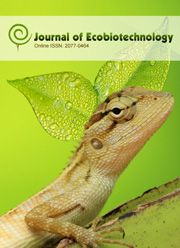Water quality assessment of Nwangele river in Imo State, Nigeria
DOI:
https://doi.org/10.25081/jebt.2019.v11.3866Keywords:
Heavy metals, physicochemical characteristics, microbiological studies, Nwangele river, water qualityAbstract
Water quality assessment of Nwangele river was undertaken using standard methods. Water samples were drawn from upstream, midstream and downstream of the river and assessed for quality. Results obtained for physicochemical characteristics showed pH (4.83±.0.01-5.00±0.31), total solid (200.00±2.40-613.19±1.10 mg/L), and total suspended solid (49.98±0.11-399.04±2.09 mg/L). Heavy metals found in the river water were iron (0.132±0.01- 0.144±0.02 mg/L), zinc (0.034±0.02- 0.044±0.02 mg/L), mercury (0.004±0.001- 0.011±0.00 mg/L), lead (0.008±0.00- 0.016±0.00 mg/L) and cadmium (0.03±0.01- 0.011±0.00 mg/L). Microbiological studies on the river revealed the presence of Klebsieilla sp., Vibro sp., Pseudomonas sp., Proteus sp., Escherichia sp., Staphylococcus sp., Shigella sp., Bacillus sp., Serratia sp., Citrobacter sp., and Enterobacter sp as bacterial isolates with high total heterotrophic bacteria count (THBC), total coliform count (TCC), Salmonella-shigella count (SSC), and total viable count (TVC). Nwangele River water is acidic, with high total suspended solid, phosphate and microbial loads. It is therefore advisable to purify water from the river before consumption. This study has assessed the water quality of Nwangele river in Imo State, Nigeria
Downloads
References
2. Asuquo FE. Physico-chemical Characteristics and Authropogane pollution of the surface waters of Calabar River, Nigeria. Global J.Pure and Appl. Sci. 1999; 6(10): 46-90.
3. WHO. World Health Report 2004 statistical annex. http://www.who.int/whr/2004/annex/en, 2004.
4. Adebowale KO, Agunbiade FO, Olu-Owolabi BI. Impacts of natural and anthropogenic multiple sources of pollution on the environmental conditions of Ondo State Costal Water Nigeria. EJEAFChe. 2008; 7: 2797-2811.
5. Adelegan JA. The history of environmental policy and pollution of water source in Nigeria (1960 – 2004). The way forward. Department of Civil Engineering, University of Ibadan, Ibadan, Oyo State, Nigeria, 2005.
6. Utang, BP, Akpan HE. Water quality impediments to sustainable aquaculture development along selected segments of the New Calabar River, Niger Delta, Nigeria. Research Journal of Environmental and Earth Sciences, 2012; 4(1): 34-40.
7. Umoren IU, Udousoro II. Fractionation of Cd, Cr, Pb, and Ni in roadside of Uyo, Niger Delta Region: Nigeria using the optimized BCR sequential extraction technique.The Environmentalist, 2009; 29 (3): 280-286.
8. Odika PC, Akubugwo EI, Ugbogu AE. Assessment of Njaba River on biochemical parameters using rats. Intraspecific Journal of Biodiversity and Environmental Science, 2014; 1(1):001-013.
9. Adamu GA, Sallau MS, Idris SO, Agbaji EB. Study of pollution level for drinking water quality assessment of Kafin-Chiri reservoir, Kano State, Nigeria. Proceedings of the 36th Annual International Conference of Chemical Society of Nigeria, Minna, Niger State, 2013; pp.274-280.
10. Akubugw EI, Nwachukwu MI, Odika PC, Duru MKC. Water quality assessment of Njaba River, Nigeria. Journal of Environmental Science, Toxicology and Food Technology, 2013; 4(6):33-37.
11. Duru M, Nwanekwu K. Physicochemical and microbial status of Nworie River, Owerri, Imo State, Nigeria. Asian Journal of Plant Science and Research, 2012; 2 (4): 433-436.
12. Ugwu AI, Wakawa RJ. A study of seasonal physicochemical parameters in River Usma. American Journal of Environmental Science, 2012; 8(5): 569-576.
13. Akubugwo EI, Duru MKC. Human activities and water quality: a case study of Otamiri river, Owerri, Imo State, Nigeria. Global Research Journal of Science, 2011; 1:48-53.
14. Nnaji JC, Uzairu A, Harrison GFS, Balarabe ML.Effect of pollution on the physico-chemical parameters of water and sediments of River Galma, Zaria, Nigeria. Libyan Agriculture Research Center Journal International, 2010; 1 (2): 115-122.
15. Akaninwor JO, Egiwm O. Effect of indo food (indomie) industrial effluent discharge of physicochemical properties of new Calabar River in Choba Rivers State. JNES, 2006; 3:173-182.
16. Amadi BA, Chikezie PC, Okeoma HC, Physiochemical characteristics of Nworie river and its effect on liver function on rats. Journal of Nigeria Environmental Science, 2006; 3(3):183-187.
17. Obasi RA, Balogun O, Ajayi O. The Physicochemical Investigation of river Irejo, Ekiti State, South West, Nigeria. Journal of Applied Science, 2004; 7(2): 4121 – 4134.
18. Obire O, Tamuno DC, Womedo SA. Physicochemical quality of Elechi creek in Port Harcourt, Nigeria. J. Appl. Sci. Environ. Mgt, 2003; 17(4): 490 – 497
19. Nnnoruka VC, Anya AO, Okafor FC. Epidemiological studies of urinary schistosomiasis in Imo State: III. Physicochemical characteristics of transmission sites in the north-west. The Nigerian Journal of Parasitology, 2002; 23:119-124.
20. Nwanebu FC, Nwabueze RN. Regime in occurrence of bacteria of public health significance of some natural water bodies in Imo State, Nigeria. Inter. Res. J. Eng. Sc. Tech. (IREJEST), 2004; 1(1): 23-31.
21. Amadi BA, Agomuo EA, Ibegbulam CO. Research methods in Biochemistry 1. Supreme Publishers, Nigeria, 2004; pp. 100- 138.
22. Hach. Water analysis handbook. Hach Company, Loveland, California, USA, 1998.
23. APHA.Standard Methods for the Examination of Water and Wastewater 19 (American Public Health Association, APHA, AWWA. Washington. DC, 2005.
24. Uzoigwe and Agwa. Microbiological quality of water collected from borehole sited near refuse dumpsites in Port Harcourt, Nigeria. African Journal of Biotechnology, 2012; 11(13):3135-3139.
25. Bergey DH, John GH. Bergey`s manual of determinative bacteriology. Batimore, Williams & Wilkins, 1994.
26. Singh THA, Meetei AS, Meitei, LB. Seasonal variation of some physio-chemical characteristics of three major rivers in Imphal, Manipur: A comparative evaluation. Current World Environment, 2013; 8(1):93-102.
27. Ray KL, Joseph BF, David LF, George TC. Water supply system, in Water resources association 4, Washington, D.C. Engineerring. McGraw Hil, 1992; pp. 497 567.
28. Oluyemi EA, Adekunle AS, Adenuga AA, Makinde WO. Physico-chemical properties and heavy metal content of water sources in Ife North Local Government Area of Osun State, Nigeria. African Journal of Environmental Science and Technology, 2010; 4(10): 691-697.
29. Garg RK, Rao RJ, Uchchariya D, Shukla G, Saksen DN. Seasonal variations in water quality and major threats to Ramsagar reservoir, India. Afri. J. Environ. Sci. Technol, 2010; 4(2): 061-076.
30. Chapman. Water quality qssessments: A guide to the use of biota, sediments and water in environmental monitoring; London, E & FN SPON, 1997.
31. Moore WT, Moore EA. Environmental chemistry. Academic press, London, 1976; pp. 360 368.
32. Gray NF. Drinking Water Quality Problems and Solutions. John Wiley and Sons: London, UK, 1994; 43-63.
33. Beka NC, Aga T, Eziashi AC. Chemical quality of groundwater from hand-dug wells in Jos metropolis and environs, north-central Nigeria. Pacific Journal of Science and Technology, 2009; 10(2):626-632.
34. Pipes WH. Bacterial Indicators of Pollution. CRC. Press Inc. Boca Raton FL, 1981. p. 242.
35. Duru MKC, Eze AA, Odika PC, Amadi BA, Chima-Ezika R.O. Consequences of long-term consumption of water from Nworie River (Owerri, Nigeria) on haematological, hepatic, and renal functions using rat model. Biokemistri, 2012; 24 (1): 52 – 57.
36. Abbasi T, Abbasi SA. Water quality indices based on bioassessment: the biotic indices. Journal of Water and Health, 2011; 9(2): 330–348.
37. Akubugwo EI, Nwachukwu MI, Odika PC, Duru MK. Water quality assessment of Njaba River, Nigeria. Journal of Environmental Science, Toxicology and Food Technology. 2013;4(6):33-7.



 .
.